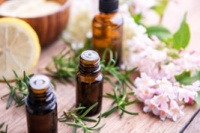Ty McDuffey
BlackDoctor.org
(Black PR Wire) Chronic obstructive pulmonary disease (COPD) refers to lung illnesses that make breathing challenging. It’s estimated that more than 11 million Americans have COPD. There’s no cure, but remedies can help ease symptoms, stop complications, and slow disease advancement.
Signs of COPD include shortness of breath, needing to clear your throat often, and frequent coughing. Individuals with COPD often have emphysema and chronic bronchitis
COPD can result from long-term exposure to pollutants or toxins, including the toxins found in cigarette smoke. Genetics may also play a part in developing COPD.
Primary therapies for COPD include:
- Quitting smoking
- Oxygen therapy
- Drugs that widen your airway, including nebulizers and inhalers
- Surgery
Home treatments and holistic therapies may also function to reduce your symptoms. Some research demonstrates that essential oils can treat COPD effectively when paired with traditional medical treatment.
COPD and essential oils
Research indicates essential oils may be useful in treating upper respiratory infections.
Upper respiratory infections include the common cold, sinusitis, and pharyngitis. These are acute disorders, meaning they endure for only a short period, generally a few weeks. By distinction, COPD is a chronic, lifelong condition. Nevertheless, both conditions concern inflammation of your bronchiole tubes.
Eucalyptus Oil
Eucalyptus oil has been used widely for centuries as a home remedy for respiratory conditions. Eucalyptus oil is also an anti-inflammatory and boosts your immune system. Using eucalyptus oil can kill destructive bacteria that worsen your COPD symptoms. It may also soothe your throat and chest and speed up healing.
Lavender Oil
Lavender oil is known for its calming scent and antibacterial effects.
Sweet Orange Oil
Orange oil has anti-inflammatory and anti-oxidant effects. In a study that likened a proprietary oil blend with eucalyptus oil and orange oil, orange oil demonstrated evident capabilities to help with COPD.
Bergamot Oil
Bergamot is another component of the citrus family. It’s famous for the way it smells and its ability to soothe the nervous system. Bergamot may work well to alleviate pain and soreness caused by the coughing symptoms during a COPD flare-up.
Frankincense and Myrrh
These two widespread, ancient essential oils have a long history of treating respiratory conditions. Research has shown their anti-inflammatory effects, and they have many other effects that may increase your health and help you feel better.
But what we know about how frankincense and myrrh help, particularly with symptoms of COPD, is primarily anecdotal. When other essential oils have been demonstrated to work for COPD, these two might rank lower on your list in terms of established remedies.
When to See a Physician
Individuals with COPD are at a more increased risk for other illnesses that affect their lungs, such as the flu and pneumonia. Even the common cold can put you at risk of further damaging your lung tissue. Don’t attempt to use essential oils to self-treat a COPD flare-up that stops you from breathing or results in shortness of breath. If you notice the following symptoms, you should seek out a medical professional within 24 hours:
- Presence of blood in your mucus
- Green or brown mucus
- Extreme coughing or wheezing
- New symptoms like severe fatigue or difficulty breathing
- Unexplained, sudden weight gain or weight loss (more than 5 pounds in a week)
- Forgetfulness
- Dizziness
- Waking up short of breath
- Swelling in your ankles or wrists
There’s no cure for COPD, but traditional treatment can be complemented by therapy with essential oils to control its symptoms. Research indicates that some essential oils can soothe symptoms, encourage healing, and boost your immune system to help prevent flare-ups for many people with COPD. You can shop for essential oils at your local pharmacy or online.

